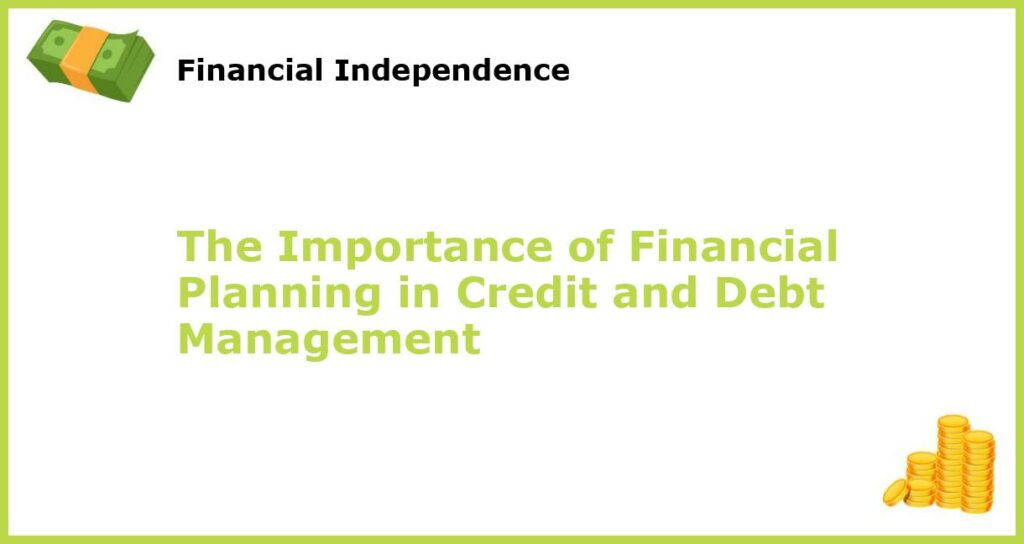Credit and debt management is a significant aspect of managing your finances effectively. Financial planning is essential to managing your financial affairs, and it is important to cultivate habits that help you stay on top of your finances. This article highlights some of the critical areas that people should focus on when looking to manage their credit and debt.
Creating a Budget

Creatinig a budget is a crucial component of proper financial planning. Often, people who have problems with their finances stem from overspending or being unable to manage their funds effectively. Creating a budget will allow you to develop a plan for your money that will guide your income and expenditure patterns. This way, you can keep track of your spending and monitor your progress, ensuring that you stay on track with your financial goals. With a budget, you can monitor your credit card debt expenses to avoid overspending or accumulating debt that you won’t be able to pay back.
Managing Credit Cards

Credit cards can be a great asset for managing finances, but they can also be the source of significant problems when not managed correctly. Proper management involves paying off balances on time, avoiding acquiring a high balance, and using credit wisely. Many people fall into the trap of using their credit card to pay off other debts; this only leads to further debt accumulation. It is crucial to avoid improper credit management habits and remember that credit cards are a temporary source of funds. This means that you should only use them when you can pay them off almost immediately.
Debt Reduction Strategies

If you’re dealing with a high volume of debt, you should consider developing debt reduction strategies to help with the burden. Some debt reduction strategies include consolidating debt, prioritizing high-interest debt, negotiating with creditors to reduce interest rates, and making a plan to pay off debts in a specific order. You need to weigh these options carefully and assess which is most appropriate for your specific situation. Debt consolidation may work for some people but lead to worse situations for others. You need to keep track of your credit report to ensure that you’re progressing towards handling your debts appropriately.
Saving for the Future

It is essential to set money aside for your future financial needs, such as an emergency fund or other long-term goals. This would allow you to cover unexpected expenses that may arise without having to incur additional debt. Saving money for future needs is an excellent financial planning strategy that allows you to manage your finances better while also preparing for unexpected financial disasters.
Avoiding Impulse Spending

When it comes to credit and debt management, it is critical to avoid impulse buying because many small, spontaneous expenditures can accumulate and lead to significant debt. Making an effort to avoid impulse buying would help keep your expenses under control and keep you from overspending, accumulating unnecessary debt. It would be helpful if you also remembered that cheap purchases can accumulate and amount to hefty sums over incredibly short periods.
Creating SMART Goals

One of the best ways to achieve financial success is to set SMART goals. SMART stands for Specific, Measurable, Achievable, Relevant, and Time-bound. Specific goals provide clear and focused objectives, making measuring progress over time easier. You can also monitor your progress and track your financial objectives to ensure that you’re on track to achieving your goals as planned. SMART goals also make it easier to figure out what areas you need to improve and how you can develop plans to do so better.
Building a Strong Credit Score

A good credit score is essential when looking to access credit and managing your debts effectively. Building and maintaining an excellent credit score will require some effort, including paying off debts, making timely payments, and avoiding new lines of credit. Good credit habits can help improve your credit score over time, allowing you to access better credit facilities and manage your debts more effectively.
Staying Organized

The need for organization cannot be overstated when it comes to credit and debt management. Keeping track of expenses, paying bills on time, and staying on top of your credit card balances are essential parts of staying organized. Staying organized helps you keep up with your budget and ensures that you do not deviate from your plan. When you lose organizational control, you will regularly fall into debts that could easily be avoided.
Getting Professional Help

If you’re having trouble managing your credit and debt, it may be helpful to enlist the services of professionals like financial advisers, credit counselors, and debt management companies. They can provide valuable guidance and support, and help you develop tailored plans to improve areas of weakness. They can also provide helpful tips on how to manage credit cards and avoid additional debts.
Maintaining Good Financial Habits

Maintaining good financial habits over time is crucial to achieving financial success. It involves consistently reviewing your budget and avoiding unnecessary expenses. Staying mindful of your expenses is of utmost importance if you want to avoid additional debt. Make a consistent effort to maintain good financial habits, and don’t allow external factors to steer you off course from your financial goals.







